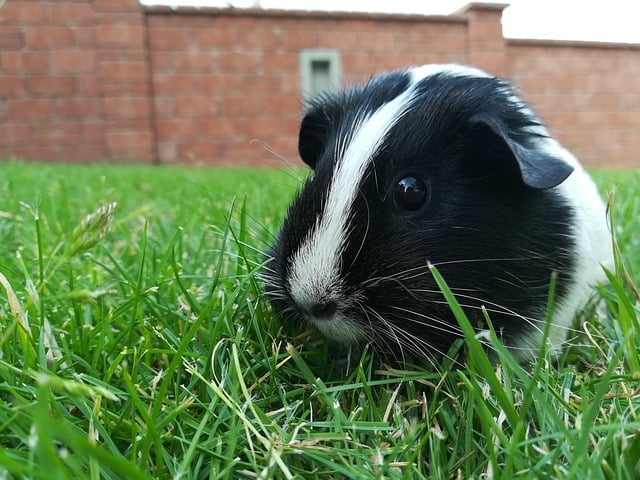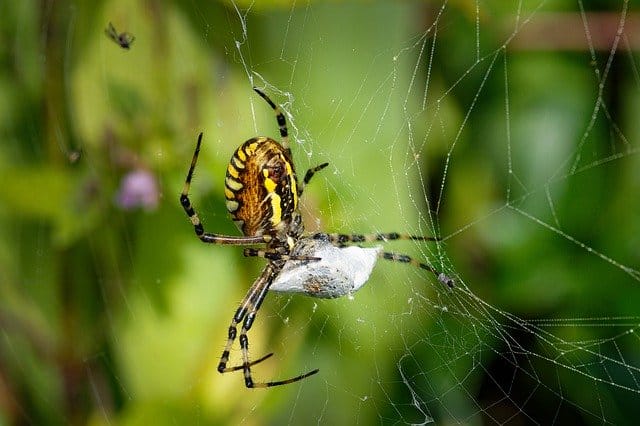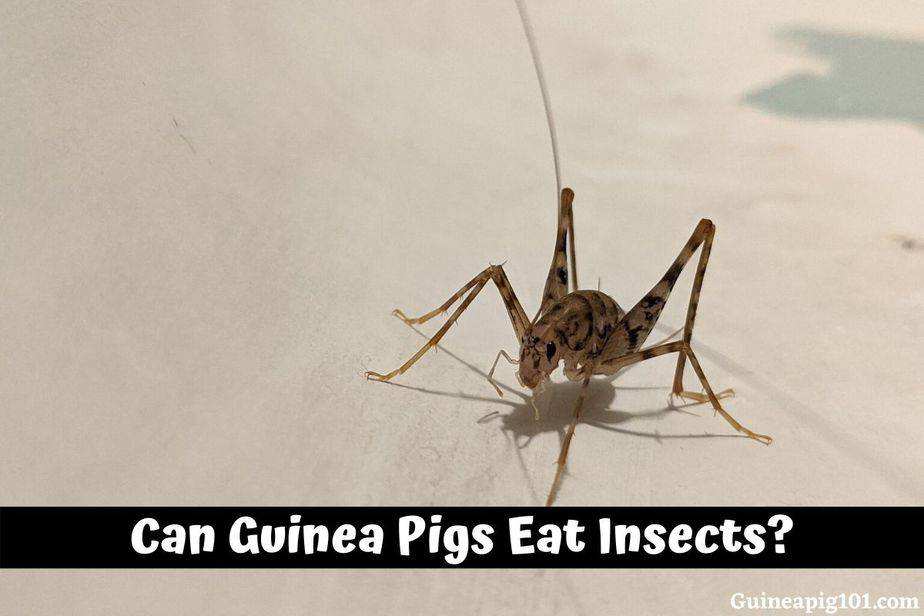Insects can easily be found in our home and yard. Despite living in close proximity, guinea pigs are not tempted by the thought of eating insects. Also, it’s because they are entirely herbivores and depend on fiber-rich grass and hay to meet their dietary requirements. But what happens if they eat one by mistake? Can guinea pigs eat insects?
As a curious guinea pig owner I did some research and here is what I have learned.
Guinea pigs might not eat insects consciously, but it may sometimes happen if caught in confusion. For example, if they find an insect sitting on the hay, they probably can unintentionally eat them along with the hay.
There is a small possibility for your guinea pigs to develop a taste for insects, but if it does happen then, they might have deliberately learned it from some other animals.
It’s very uncertain for your guinea pigs to fall sick after feeding on insects.
If they do, it’s due to the insect that has been carrying a disease(vector) or had some other self inbuilt defense mechanism to protect them from predators.
Do guinea pigs eat insects?
No, guinea pigs will rarely eat any insect willingly.
Guinea pigs are pure herbivores and wish to continue their lives dominantly on hay and grass rather than eating insects.
Guinea pigs entirely depend upon fiber-rich sources to meet their daily required nutrition.
Whereas insects are a good source of protein, therefore, making them a nonessential food source for guinea pigs.
Surely, they are not one born with a habit of eating insects. It is an adapted habit they have learned from others.
Also, they do not have the necessary skills and style of predator-capturing and killing.
The idea in itself of hunting is too much for guinea pigs.
Hence, they do not like to put much of their energy on searching or hunting.
Instead, they will go in and out everywhere in open spaces to search for food, and if met with scarcity will not back step to climb trees to get their food.
Domestic guinea pets are similar to their wild counterpart(capybara) in this behavior. They, too, avoid hunting activities and prefer foraging for food.
Guinea pigs are never going to eat an insect knowingly, but they might do it unknowingly.
For say-while eating hay, a bug came over it, so it might go undetected through the eyes of guinea pig and can be ingested along with the hay.
What kind of insect can guinea pigs eat?

Well, If it goes unnoticed, then guinea pigs can eat insects of different varieties such as moth, aphid, flies, and caterpillar.
Accidentally, they might go on eating crickets of size ranging about two inches in length, which again is very rare.
Though, smaller bugs can go unseen and therefore, can be consumed by them.
One other animal that could be of interest for them is the ants, due to their small size, shape, and ready availability on grass and hay.
Ants for guinea pigs are an easy target if caught by them. They are pain intolerant, therefore, are very reactive and sensitive towards pain.
So, if your pet stopped by somewhere to eat the grass in the lawn and bring ant bites in return, soon enough, you may find them restless for a while because they have lower pain tolerance ability, unlike human beings.
If, at some point, your house is under an unexpected attack of bugs, better call a pest control team to get rid of them. These pests can be bad for our guinea pig’s wellbeing.
While pest controlling keeps in mind, the toxicity of the chemicals makes sure to protect your guinea pigs against any serious after results.
Are guinea pigs allowed to eat bugs?
Guinea pigs shouldn’t eat bugs but eventually will end up doing it anyway.
But it is best to keep the pest away as far as possible because most insects are vectors(carry diseases) and have an in-built self-protection mechanism that may harm them in one way or another.
For example, if your pet finds a cockroach and manages to sideline them, further biting or swallowing cockroaches might go wrong.
They are disease-carrying animals and can thus affect the health of guinea pigs.
Cockroaches and beetles have a hard external skeleton, despite guinea pigs’ powerful teeth eating, insects might choke their throats since they have a small oral passage.
Guinea pigs have a proper metabolism for digesting smaller bugs, but exact is not the case in more significant bugs. Some difficulty may arise in the process of digesting larger bugs, which further can lead to severe blockages.
My guinea pigs keep eating bugs
If you catch your guinea pig eating small bugs, then it’s something that might worry you.
There is no need to worry until your guinea pigs show any sign of ill health and kindly avoid it if looks perfectly fine in their behavior or routine work.
Possibly they have learned this different characteristic from predatory species.
Don’t forget to take them for routine check-ups. Guinea pigs often do not like to disclose any health-related issues or any discomfort.
As a guinea pig owner, make sure they are not hiding any aches or pains.
Also, find out the reason for them being so interested in chewing insects. If you are a pet-friendly person and have a big enough family of the pet’s in your house, such as dogs, cats, birds, etc.
Then undoubtedly, this learned behavior is somewhere influenced by the other pet species present at your home.
How to stop a guinea pig insects?
That might be a difficult task to get done through. Though, it could be achieved with the application of some training, techniques, and skills.
You need to train them and make them learn a similar withdrawal action they have towards electrical shocks or danger.
Since we already mentioned, it would be a bit difficult task to achieve as guinea pigs are smart animals and would, therefore, assume you for being a spoilsport to their fun.
Initially, all your efforts to distract them from eating bugs might go into total waste. Considerably they are strong-willed animals and, therefore, would make it a difficult task for you to achieve.
Try moving guinea pigs in and out in a bug-free zone for the time being.
Do regular dusting and housekeeping, which minimizes the chances of bugs even being found out. Not sure if this strategy would work due to the efforts and time it demands, but what does it take to give it a try at least.
Do guinea pigs eat fleas or ticks?
Of course, they do eat common parasites such as fleas and ticks.
For say, if at the time of grooming their partner they find a flea attached to their body, then they will step up and won’t spare them.
They will use all their power to remove the fleas and at last can even eat them up in the process of removing the same.
If the fleas have previously sucked the blood of an animal with a disease, then it’s a matter of concern for you. There is a high risk for your pet to fall sick after chewing.
If attached to the fur or skin, fleas may be eaten by guinea pigs while doing the itching to their skin.
Fleas are carriers of tapeworm larvae and thus would enter into the intestines of your pet, depriving them of all the essential nutrients
My guinea pig chases flies and moths
Chasing moths or flies is a source of fun and enjoyment for guinea pigs. A character that has been learned from other animals.
Guinea pigs are blessed with excellent hearing ability. The buzzing sound of flies and moths would catch their attention instantly.
Flying of flies, and moths in and around guinea pigs might appear to them as a playful act. Thus motivating them to knock down the insects and in best interest killing them.
If you see a vast number of flies in and around your pet’s cage, it should be taken seriously. That could be an indication of flies laying eggs on your guinea pig’s fur or skin and thus can cause flystrike, a severe medical condition.
So do not ignore the gathering of flies in and around your pets.
Especially during summers, give your pet regular bathe and grooming to protect them from unwanted insects, particularly from flies.
While guinea pigs eating hay or grass, moths can unintentionally come upon their food. Though comparatively, moths are not as harmful as others but still can be quiet irritating for your pet.
Would my guinea pig try to eat bees or wasps
No, guinea pigs would not try to eat bees or wasps, because they see bees and wasps as a risk to them.
If you see a hive of bees or wasps anywhere around where your guinea pigs plays, ultimately get it removed as they are sensitive animals and they might get afraid to see them around.
Clear your pet’s nearby living area regularly. Leftovers of your pet’s food are more likely to attract bees and wasps, and it could spark a fight between the two species.
If removing the hive could not happen on an instant, try and make a shift in your guinea pig’s play area somewhere safe and comfortable.
First of all, take the necessary action to deal with the pests and move your pet temporarily until the bees or wasps hive is removed.
Would eating spider make my guinea pig sick

Not all of the spiders make guinea pigs sick, just a few of them do so.
We all know spiders are known for making spider webs. If your guinea pigs don’t mind them doing their business and if the two adjust well together, nothing would be better.
Spiders like to eat indoor insects and flies, and this will keep your pet off from infection caused by the insects.
Careful, not all the spiders are risk-free and safe. Some with poison might kill or hurt your pet.
Remember, guinea pigs are susceptible animals with a weaker immune system. They are very fragile towards poisonous stings and bites.
Unless teased, spiders will not cause any harm to them. Instead, spiders will be more afraid of guinea pigs than vice-versa.
If neither of them is doing any harm to each other, Then they both can live happily and peacefully together.
However, watch out for scorpions and arachnids. They can prove to be deadlier. There is nothing more dangerous and poisonous than spider sting.
Pincers and tail strings could cause a higher degree of pain to your pets. As a whole, do not support your pets for eating insects or bugs.
There is no additional health or nutritional benefit that comes from ingesting bugs. Instead, your pet would end up with upset digestion, or it may cause any other harm to them.
Sources: Cockroaches as a disease carrier, Production, and characterization of guinea pig IL-5 in baculovirus-infected insect cells, Diet Composition and Mineral Balance in Guinea Pigs, Dietary Vitamin C, and Vitamin E on Guinea Pig Immune Responses to Mitogens, Vitamin C requirements of the guinea-pig, Is Your Guinea Pig’s Diet Providing the Right Nutrients? Care of Guinea Pigs.
